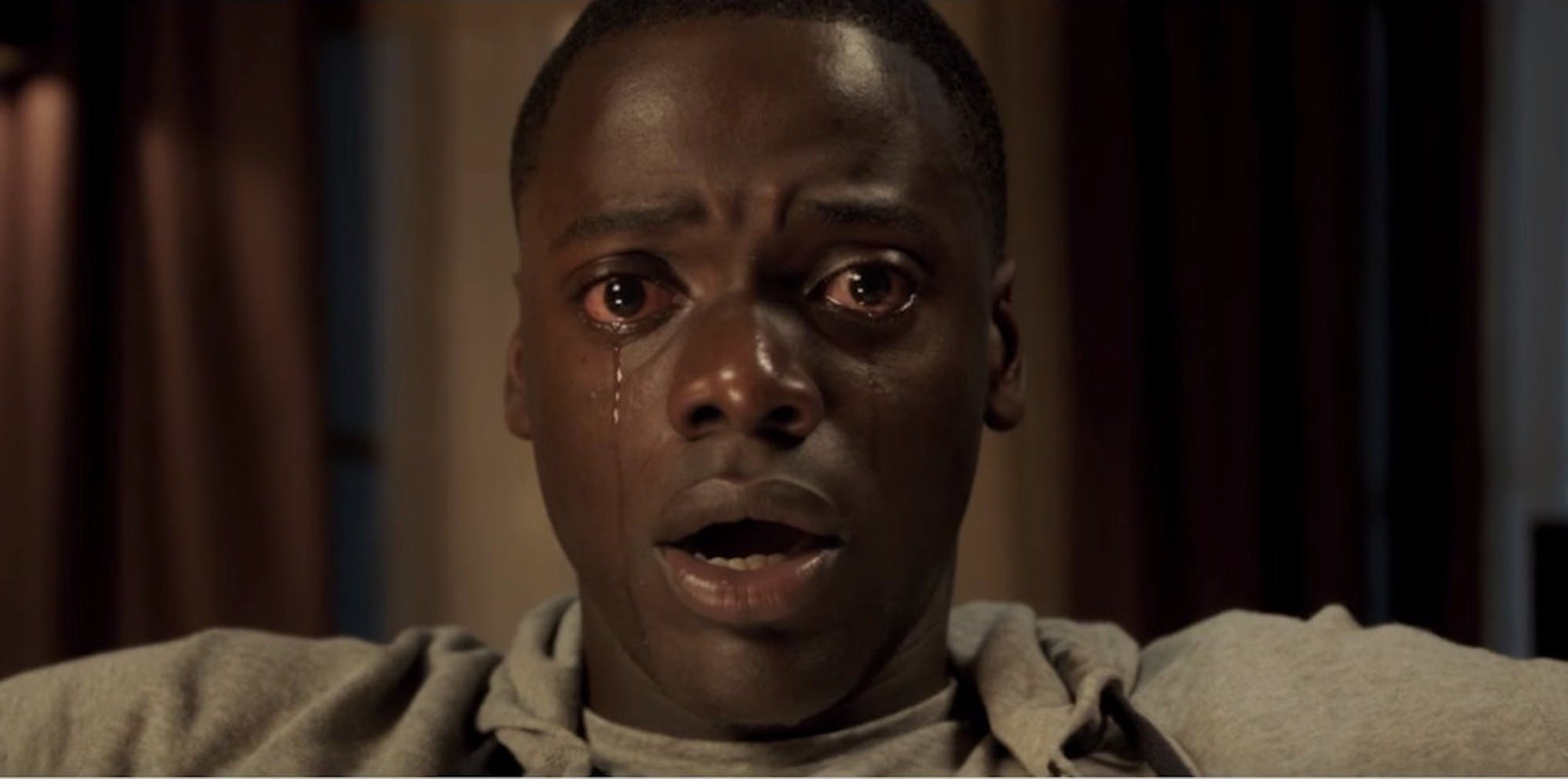Jordan Peele is widely known and liked largely because of his work on the Comedy Central series “Key & Peele” (2012-2015), which features short sketches that get audiences laughing. So when word got out that Peele was working on a movie more focused on terror than comedy, many were skeptical of the end result, questioning whether Peele should bother creating more serious content. However, the end result blows any and all skepticism away: “Get Out” (2017) is a wonderful experience tinged with perfect amounts of comedy amidst the darker subject matter, all of which enhance pointed and relevant social commentary.
The movie opens as black photographer Chris Washington (Daniel Kaluuya) and his white girlfriend Rose Armitage (Allison Williams) are getting ready to spend a weekend with Rose’s parents, who are also both white. While anxious about the fact that her parents don’t know he’s black, Chris nonetheless heads up with Rose. He soon meets her mother Missy (Catherine Keener) and father Dean (Bradley Whitford), along with Rose’s younger brother Jeremy (Caleb Landry Jones), all of whom exhibit racist tendencies toward Chris. However, what begins as an uncomfortable experience soon becomes decidedly unsettling when Chris observes the Armitages' groundskeeper Walter (Marcus Henderson) and maid Georgina (Betty Gabriel), who are both black, acting strange. As his stay progresses, it becomes clear that his very life might be in danger.
One reason the movie is so successful is the powerful blend of horror and comedy. The terrifying chills from the film’s darker moments are offset perfectly by almost unnatural moments of comedic relief, whether that stems from Chris' comments made under his breath or his friend Rod’s (Milton Howery) hilarious dialogue. What the film avoids doing, much to its credit, is relying too heavily on comedy. The balance it strikes is marvelously well-done, and it will keep viewers entertained throughout the movie while simultaneously ensuring that the plot does not become locked into a particular genre. Furthermore, the acting is solid all-around; from Kaluuya as Chris to Keener as Missy, the actors know what their characters are supposed to portray and how to successfully achieve those portrayals.
Ultimately though, the film truly shines by dealing deftly with an uncomfortable and often-mishandled topic in movies: racism. The movie starts out as a film about a black man concerned about meeting his white girlfriend’s family, but by the ending credits, Peele has managed to enact a narrative of the ways black people are still tokenized and reduced and the ways white people both desire and mistreat them.
Part of what helps the film approach racism is a terrifying plot twist that utilizes racial fear to an effective extent, but the larger part is simply that Peele knows what he is trying to describe. Whether it is Rose’s father saying, “I would have voted for Obama for a third term” or Rose herself ranting about her semi-racist family as Chris is forced to nod along in mock surprise (both of which should absolutely be cringed at), the awkward moments -- much like the horror/comedy dynamic -- blend right into the big moments when Peele shows how black people face often unfairly disproportionate hardships in the United States today. As the film moves past the halfway mark, Peele has already subtly introduced the idea that white people believe, as one character says, “black is in” today in the United States. Meanwhile, black characters such as Chris are forced to suffer the indignation that this jealous and ultimately false belief exists and prevails in the United States today.
By transforming this message of inequality into a movie plot, Peele has created a work that confronts people who wouldn't otherwise think about racism. The ending scene is particularly powerful because of the ways Peele plays off the tenuous relationship between the police and blackness, and the movie ends wonderfully, toeing the line between gut-wrenchingly familiar and marvelously re-assuring.
All in all, “Get Out” is not just a good film. It is a good film with a point. It is not meant to just scare audiences or make them laugh; it reveals the hardships that certain people face today in the United States while warning against a white desire to take advantage of black people and the societal problems that black people face. This well-directed movie is meant to be viewed and talked about. In the current political and social atmosphere, it is more important than ever that all voices and anxieties are heard, validated and respected, so “Get Out” to a theater near you and give this movie a shot -- you won’t be disappointed.
'Get Out' blends horror, comedy to address U.S. racism

Summary
"Get Out" is a beautifully directed film with an important social commentary.
5 Stars





